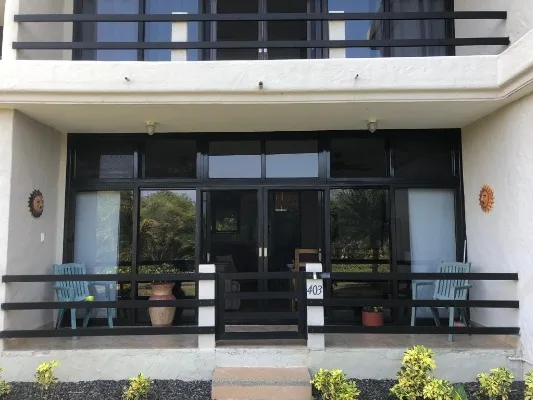Fight for the Ecuadorian Amazon pits government against indigenous villagers
By Jonathan Watts
Military drones and police helicopters circle above the Shuar indigenous village of El Tink, an Amazonian community in Ecuador where a high-profile dispute against a Chinese copper mine has become a standoff and a siege.
 Aerial surveillance is the only way the authorities can monitor this cloud forest enclave because residents have blocked the sole entrance to their home: a bouncing plank-and-cable bridge suspended 15 metres above the brown torrents of the Zamora river.
Aerial surveillance is the only way the authorities can monitor this cloud forest enclave because residents have blocked the sole entrance to their home: a bouncing plank-and-cable bridge suspended 15 metres above the brown torrents of the Zamora river.
Some wear masks to hide their faces. Others appear so casual, they could be out for an afternoon stroll. But together, they take it in shifts to guard the crossing 24 hours a day. Friendly vehicles are allowed through. Government forces are turned back, but the siege is exacting a humanitarian toll on the villagers.
“The river protects us. The military can’t cross the bridge because we guard it day and night. If they come, we’ll set fire to it,” said Alfonso Chinkiun. “But we feel like we are captives. We can’t leave this place because we fear we will be arrested. That means we can’t work so we have to forage deep into the forest for food. Some days our children go to sleep without eating a single meal.”
Chinkiun is one of a few dozen people who recently sought sanctuary in El Tink after a bloody confrontation with security forces sparked by a dispute with a Chinese mining company Explorcobres SA (EXSA), in their previous home of Nankints on the other side of a mountain ridge in the Cordillera del Condor.
They were forced to flee here after a policeman – José Mejía – was killed during a protest on 14 December. Blaming the death on the demonstrators, the authorities declared a state of emergency in the province of Morona Santiago, raided homes and made several arrests, including the president of the Inter-Provincial Federation of Shuar Centers, Agustín Wachapá.
The Nankints refugees said they had to run to avoid capture. “We fled into the woods with our families. We walked here over the mountains at night. It was very traumatic,” said Guillermo Uyunkar.

Children from El Tink.
He acknowledged the community had fought eviction for several months and showed three small scars on his arms and shoulder that he says are the wounds from live rounds fired by the military.
The security forces initially arrived in Nankints on the night of 11 August, surrounding the small community of 32 families with vehicles that revved their engines to intimidate the residents.
“We decided to defend our land. The military police fired gas at us and set fire to the grass. They killed our animals. We cut down trees and tried to build barricades, but they ploughed through them with armoured cars,” recalled Uyunkar.
The evicted residents scattered to nearby villages and then regrouped several times over the following months for demonstrations that sometimes ended in violent skirmishes.
Alex Chuji, external relations representative of the Shuar Arutam People, said the Nankints community were entitled to fight for their territory because they had not been adequately consulted about the plans for the mine as they were entitled to be under the Ecuadorian constitution and UN treaties on indigenous rights.
However, he rejected claims that the bullet that killed the police officer was fired by one of the protesters. Ballistic tests, he said, indicated it was more likely to have come from one of the police or military guns.
“We do use weapons to defend our land, but all we have is spears, machetes and the old carbine rifles we use for hunting. We don’t have modern guns with the calibre of the bullet that killed José,” he argued.
Diego Fuentes, the deputy interior minister, previously told local media the shots were fired from the forest by a marksman using a specialised rifle, so the authorities assume the intention was to assassinate a policeman.

A bridge outside El Tink.
President Rafael Correa has accused the Shuar leadership of supporting “paramilitary and semi-criminal” organisations. He said the indigenous group’s territorial claims were based on a “lie” because the land had been bought and sold several times.
Tensions have been growing for some time. The indigenous group’s representatives claim this corner of the Amazon was theirs long before the first Spanish colonisers arrived, and that in the years since they have been given little choice in land demarcations decided by governments with more military, economic and political power.
In 2000, when the territory was packaged up for copper mining concessions, they began to resist and occupied the land at Nankints and elsewhere that they had previously only been given permission to hunt in.
The Shuar – like most indigenous groups in Ecuador – initially supported Correa when he was elected in 2006, in the hope that he would formalise their claims. But they said he has since betrayed their interests in order to secure foreign – especially Chinese – loans and investment. There have been several flash points, including the death of José Tendentza, a Shuar leader, in 2015.
“It feels like the state is at war with us, but this is a pointless conflict. If the laws were followed, this would never have happened,” said Raul Petsain, of the Shuar Arutam People. “Correa has always been working in the interests of capital. In his campaign he promised to work for the people, but once he got power he worked for the companies.”
The Chinese company, Exsa, is part of Ecuacorriente, which is jointly funded by Tongling and China Railway Construction Company (CRCC). In an emailed statement to the Guardian, the company said it purchased the land in 2000 from local owners, some of whom had lived there previously for 30 years.
It said that in 2006, the area was “violently invaded by anti-mining groups”, forcing the company to abandon the site. For the following nine years, it said there were attempts at peaceful negotiation to remove those who occupied this land. After this failed, the statement says the company filed a lawsuit and won judicial approval for the “invaders” to be evicted, which “proceeded without any kind of violence”.
Although the government recently lifted the state of emergency and a new president will take power later this year, locals expect their struggle to continue.
The office of the governor of Morona Santiago state did not respond to a request for comment.
At El Tink, the host community is feeling the pressure. Many have taken refugee families from Nankints into their homes and shared food with them. But there is not a lot to go around. Many complain the authorities are treating them as terrorists and trying to provoke a reaction.
José Luis Aynui, president of the Shuar Arutam says it is a tough situation for all involved, but if they do not make common cause, El Tink could be the next village where residents are evicted.
“All of this land is a mining concession for the Chinese,” he says, pointing to the nearby hills. “They haven’t dared to come to develop it yet because they know we are strong. But if they had their way, the land we are on now would be a mine. The only way they will take this land is if we all end up dead.
“We won’t give it up. And they can’t give us an alternative because it will never be like what we have now. The forest is not just our home, it is our church, our larder, our pharmacy. If you take us away from it, we lose what we are.”
_________________
Credit: The Guardian, www.theguardian.com


















